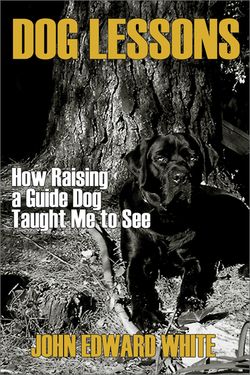John Edward White found that raising a guide dog changed everything
by Timothy Rutt

John Edward White was working in aerospace and unsatisfied.
Unmarried, childless, and in his late 40's, White was working in aerospace as a technical writer and feeling that there should be more than just going to a job.
"I was working in an industry that I didn't feel there was any way I was making a substantive contribution to the world.," White said. "It was just a job. And somewhat important to me was to realize a larger role than just logging in to an 8-5 job. So I was dissatisfied and unhappy and i identified the source of that unhappiness as the role I was playing. I was in my late 40's then and at an age when I was thinking of the larger picture, why I was here, why I was in this world?"
In White's case, his midlife crisis manifested as a call to service that changed his life.
White said that he was watching the Rose Parade on television and saw some Guide Dogs for the Blind in the parade. That reminded him of watching a guide dog at work that he saw many years before, an encounter that left an impression on him.
The dog makes a difference
"That resonated with me, and so I thought I would contact Guide Dogs for the Blind. And that resulted in my raising a guide dog, and it changed me as a citizen and a man."
White has recently released a memoir, Dog Lessons: How Raising a Guide Dog Taught Me to See, where he writes about his relationship with Gruden, the Labrador puppy he raised.
Raising a guide dog puppy is different than training a guide dog: from about weaning to the age of 18 months, volunteer "puppy raisers" shepherd their dogs through the rambunctious puppy stage before guide dog training actually begins. The dogs still wear a colored jacket, and they're taken to many different places to experience situations and see if they'd be a good prospect as a guide dog.
White attended several local meetings of puppy raiser clubs, and completed an extensive screening application. He also had to pass a home visit and assessment by the leader of the puppy raising club, who reports to Guide Dogs for the Blind. Once you pass through those hurdles, you get in line to receive a puppy.
Complete commitment
"Who makes a good puppy raiser?" White said. "It requires a complete commitment to the puppy raising task. There is an extensive guidebook that determines how you raise a dog. A prospective Guide Dog for the Blind is not raised like a regular dog. There are some very specific commands that you learn and don't learn. The principal role of the raiser is to provide as much socialization for the dog as possible."
As for the dog, "It requires a personality that wants to do the work," White said. More than half of the prospective guide dogs are "career-changed" during training, because they don't have the right physical attributes, or don't have the ability to focus, or otherwise are unsuitable as a guide dog.
 There was also an obstacle for White: Gruden was the first dog he had ever owned. Growing up, he said, "My father … had terrible allergies, which is why we never had pets, but he liked animals."
There was also an obstacle for White: Gruden was the first dog he had ever owned. Growing up, he said, "My father … had terrible allergies, which is why we never had pets, but he liked animals."
Having been approved as a puppy raiser, White received Gruden, a square-headed, joweled English Labrador. Once Gruden was in his life, the lessons began. "Taking care of a pet requires a great deal of patience, and that taught me to have patience," White said. "My experience with Gruden taught me the appreciation of small joys -- living in the moment, which is what animals do."
Puppy love
Gruden was a puppy, and would sometimes act like a puppy, which sometimes involved destroying things. "Even though I got angry at him, he forgave me for that," White said. "He skulked away, and then I calmed down and felt terrible for that outburst."
"Finally, I guess I wasn't a perfect raiser. I made all the mistakes a new owner would make, but my dog always forgave me. He never held it against me that I'd done something incorrectly or even if I acted angrily."
With his new companion in tow, "I took this dog everywhere I went," White said. "The interesting thing about a big laborador retriever, they are approachable animals."
White found that life with a dog changed many other parts of his life: "I met many other dog owners walking my dog and developed a circle of acquaintances and met many interesting people I wouldn't have met any other way -- people involved in documentary film, dance, spiritual therapy, healing arts, bankers, financial people, and I think as a technical writer in the aerospace or electronics world I might not have developed relationships with people in those other professions."
Still a happy ending
After raising -- and learning from -- his puppy, Gruden left in 2002 for formal guide dog training. It is usually during this period that dogs are "career-changed" -- less than half of the puppies become guide dogs for the blind.
"Most dogs that are career-changed from guide dogs often go on to other service careers," White said, such as comfort dogs that visit hospitals. Some end up going to homes: "They generally have a very good health record and very good training, so they end up being excellent pets."
Sometimes, the raiser is given the opportunity to adopt the dog if it washes out, but White said that often raisers are raising another dog by then and don't want to adopt the dog back.
In Gruden's case, he washed out of training, and White adopted him as his own in 2004. Gruden died earlier this year.
"The most significant thing I can point to is, as a single individual, this dog gave me some place to put my love," White said. "Doing so, I think it changed the way I interacted with the rest of the world.
"On a personal level, I'd like to say benefit of making a change in your life outweighed the fears. On a general level, i think that finding some way to give back to the community is very rewarding and worth consideration."
Dog Lessons is available in paperback and Kindle editions through White's website, JohnEdwardWhite.com.



